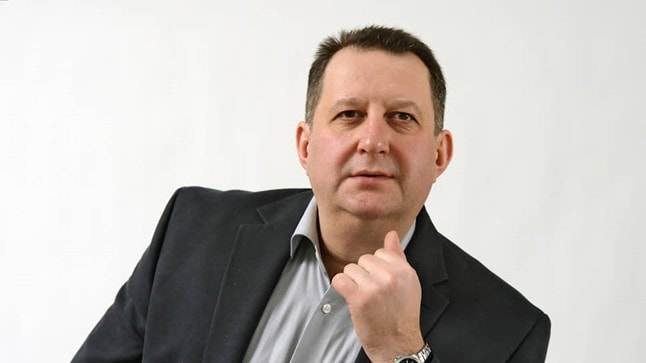Although Russia's economy has shown more resilience to sanctions than was expected, the war and the sanctions are taking their toll. Two obvious economic weak points are the budget deficit and labor shortages. Economic policy remains one of the few areas open to relatively free debate. On one side of the debate are advocates of a return to a Soviet-style command economy, or at least one that extends priority to guns over butter.
In an interview, Yevgeny Prigozhin, the owner of the Wagner Private Military Company and a fierce critic of the defense establishment recommended following the example of North Korea: "Russia needs to take a page out of North Korea's book for a certain number of years: close all our borders, stop pulling punches, bring back all our boys from abroad, and work hard. Then we'll see some kind of result."[1] If Russia is not ready to go full Pyongyang, then the economic left has some specific remedies. The Communist Party has introduced a bill that would modify Russia's flat 13% tax rates and establish higher tax brackets for the wealthy in an effort to replenish the government budget. If Russia faces labor shortages, this can be remedied by a six-day work week, they posited.
The Russian government has so far refused to take this route. Perhaps there is a realization that trying to exact more from the population at a time of growing economic pains will not enhance the regime's popularity. After all, in past election cycles, Putin and the ruling United Russia party campaigned on the theme that Putin and co. have successfully extricated Russia and its citizens from the economic freefall which followed the Soviet Union's collapse.
Also, as opposed to other issues such as persecution of dissidents or the legitimacy of the war in Ukraine, debate on economic issues has not been shut off, and opponents of a return to Soviet economics can still express themselves. MEMRI presents two columns pushing back against proposals by the economic left and arguing that such moves will disincentivize work and cause further demoralization in difficult times.
The first article is by Kommersant political observer Dmitry Drize and the second is by the financial commentator Semyon Novoprudsky. Below is the full text of both articles:

Heading reads: They are proposing to introduce a six-day work week in Russia (Source: Vlad [@ slowtwit] /Twitter)
Dmitry Drize warns[2] that a six-day work week would not go down well after the government previously broached the idea of a four-day work week and had generally insisted that the economic situation was rosy.
"The Avant, Association for the development of business patriotism approached the head of the Labor Ministry, Anton Kotyakov, with a proposal to introduce a six-day work week. According to the 'business patriots,' this would help increase the Russian economy's durability in the face of modern challenges. The Great Patriotic War is cited as an example, as well as the experience of several Asian countries, in particular Nepal and Iran.
"Senator Andrei Klishas responded negatively to this entire proposal. According to him, such an idea contravenes the principles of the welfare state [stipulated in the Russian Constitution]. It is clear that the patriotic businessmen need to somehow remind people about themselves. And now we may congratulate them, as they have partially succeeded. Naturally, the initiative is unlikely to receive any legislative implementation, though, who knows? But on the whole, it is an interesting topic.
"First of all, they were just talking about introducing a four-day work week, and also about the fact that the country is coping confidently with all challenges, and is completely covered. Inflation is low, industry is operating, and there is no cause for concern.
SUPPORT OUR WORK

"And here we are witnessing proposals resembling a [Soviet] mobilization economy. Second, the Russian people have not been particularly pampered by good news that personally affects them. And in this regard, it turns out to be the opposite, there is the prospect of working one more day. And that cannot be good news.
"But why coerce people [to work?[ One should help the state voluntarily, out of lofty sentiments, shouldn't one?
"Let's step back into history for a moment. The six-day working week existed in the USSR from 1940 to 1967. In 1977, the Constitution enshrined that the working week should last 41 hours (no more, no less). Thus, now they suggest that we return to the year 1940, that is, before the Great Patriotic War began. And we are advised to follow the example of Iran and Nepal. Well, then, what does such a reality signify?
"But on the whole, it cannot be overlooked that we are moving faster and faster into the past every day. As mentioned above, just yesterday it was said that modern reality makes it possible to work not even five but four days a week, but perhaps the past seems more attractive. We, on the other hand, we have a special way of doing things, so what is there to be surprised about?"

Dmitry Drize (Source: Kommersant.ru)
Semyon Novoprudsky argued that in a time of labor shortage it made no sense to introduce a tax raise that would penalize those willing to work harder. Novogrudsky commented:[3]
"All attempts to raise taxes on individuals under sanction conditions and Russia's growing demographic problems directly harm the Russian economy. But attempts to 'encroach' on a relatively small and, most importantly, stable income tax continue.
"The other day, CPRF deputies [Communist Party of the Russian Federation], led by party leader Gennady Zyuganov, introduced a bill to the State Duma to increase personal income tax (PIT) rate to 30%. The initiative concerns a differentiated income tax. The authors of the bill propose levying the standard 13% on individuals with an income of up to 5 million rubles a year, on those earning more than 5 million rubles per a year – 15% (starting from 2021, both residents and non-residents pay taxes according to this rate for amounts exceeding 5 million rubles), and for incomes over 10 million rubles – 30%.
"The logic that the law's authors followed is purely fiscal. They cite data from the Russian Ministry of Finance on the decline in federal budget revenues in January 2023 compared to January 2022 (I hope the Communists understand what even occurred during that period). And for the sake of meeting the same Ministry of Finance's 2023 budget deficit 'plan' of 2.9 trillion rubles, they propose a 30% income tax on high incomes.
"However, the same Finance Ministry, which, unlike the CPRF, is responsible for budget execution and revenue replenishment, provided a negative opinion on the bill. Moreover, the government has recently prepared a final version of amendments to the tax legislation, in which it abandoned the idea proposed by some deputies for political reasons of levying 30% personal income tax on employees of Russian companies who fled abroad.
"It was decided to tax the income of such employees at standard rates: 13% (or 15%, provided income exceeds 5 million rubles a year) regardless of tax residency status. The tax agent [collecting the tax] will be a Russian company, as the employer, or customer of the work done by the employee. This will apply to both full-time employees working under labor contracts and those who work under civil law contracts [ad hoc agreements]. The amendments are due to come into force on January 1, 2024.
"The Ministry of Finance understands that to aggravate the workers' financial conditions in the current Russian situation, considering the prospects of the economy and the labor market, is definitely not an option that will facilitate budget replenishment and stimulate the economy. Officially, a tiny fraction of Russians enjoys an income of over 10 million rubles a year (i.e., over 500,000 rubles a month) upon which the Communists propose levying a 30% income tax. Furthermore, these people have opportunities to 'repackage' their income so that it won't reach the 10 million rubles per annum ceiling. But the main problem is that for objective reasons, the Russian authorities need to maximize incentives for workers in the labor market.
"According to a Bank of Russia recent survey, in quarter one of this year, Russian businesses demonstrated record staff shortage in the 25 years since the surveys began. The reason is the demographic decline of the 1990s and early 2000s, as well as the departure of a portion of skilled personnel from the country. All this is happening against the background of sanctions, which compel Russia to seek internal reserves for economic development, instead of relying on the super profits from energy exports that have become customary over the past two decades.
"What's more, the long-standing and relatively small, judging by world standards, income tax rate is virtually the last 'hearth' of stability in a current situation of record economic uncertainty in Russia (since at least the beginning of the century).
"Therefore, keeping the personal income tax rate at its current level is important even for [maintaining] the minimum psychological comfort of people, let alone for economic reasons.
"Naturally, the idea of 'taking more from the rich' has always been popular in Russia. Only now, it's time not to take, but to create; a time not to destroy, but to build. Both the economy and the workers fundamentally need to earn more money. The task of the state is to generate the necessary conditions for this. It is better and more reliable to replenish the treasury through the country's economic growth and development, rather than through an emergency tax increase."

Semyon Novoprudsky (Source: Smotrim.ru)




